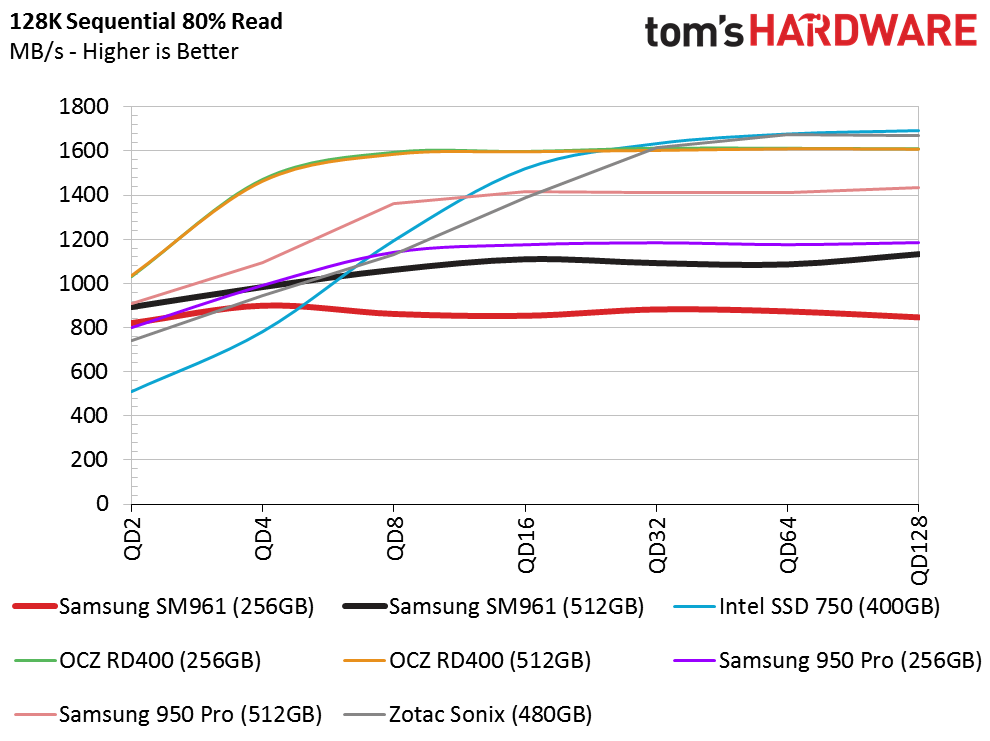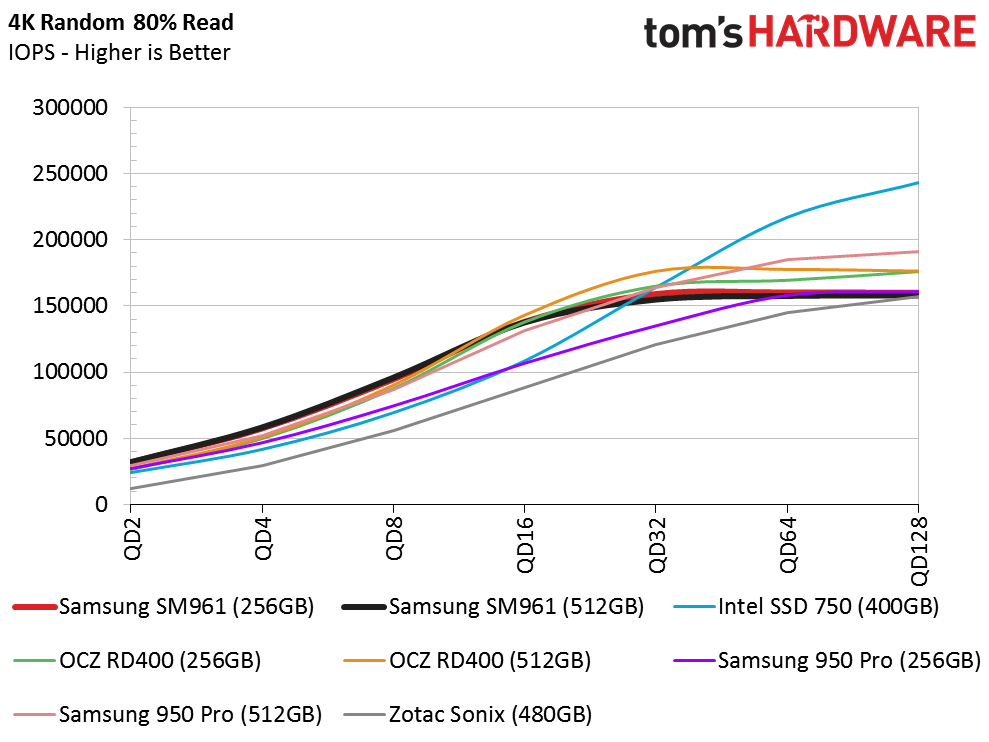Samsung SM961 512GB & 256GB SSD Review
Why you can trust Tom's Hardware
Mixed Workloads & Steady State
80 Percent Sequential Mixed Workload
Our mixed workload testing is described in detail here, and our steady state tests are described here.
Even though the SM961 has a large advantage in the 100% sequential tests, it loses ground to other products with mixed sequential data. In the past, we've seen this type of behavior tuned with firmware updates to increase the mixed workload performance. The SM961 SSDs are still very early in the release cycle, and we are testing with the first mass production firmware. Samsung isn't known for releasing several small updates, so when a new firmware is released it usually comes with several changes.
The Samsung SM and PM series firmware updates pose other issues when purchasing a bare drive. Users generally get the updates from HP or Lenovo. These updates are not advertised through traditional means. Usually, a user will stumble across the update and then share the information in a technical forum.
80 Percent Random Mixed Workload
The SM961 256GB and 512GB perform much better with mixed random workloads compared to the other drives. The random read performance advantage at low queue depths shines through during this test. At high queue depths, we see the performance limitation comes into play again just after queue depth 16, while the Intel 750's performance continues to scale. The Intel 750 uses a 9-channel controller designed for enterprise use, so the result is not surprising.
Sequential Steady State
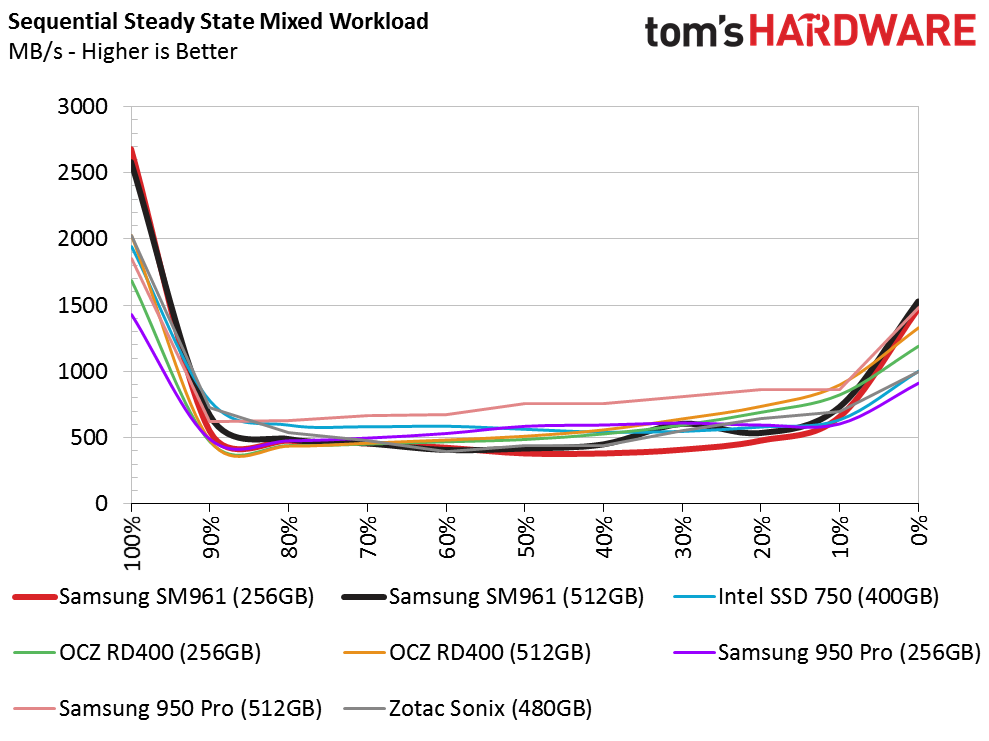
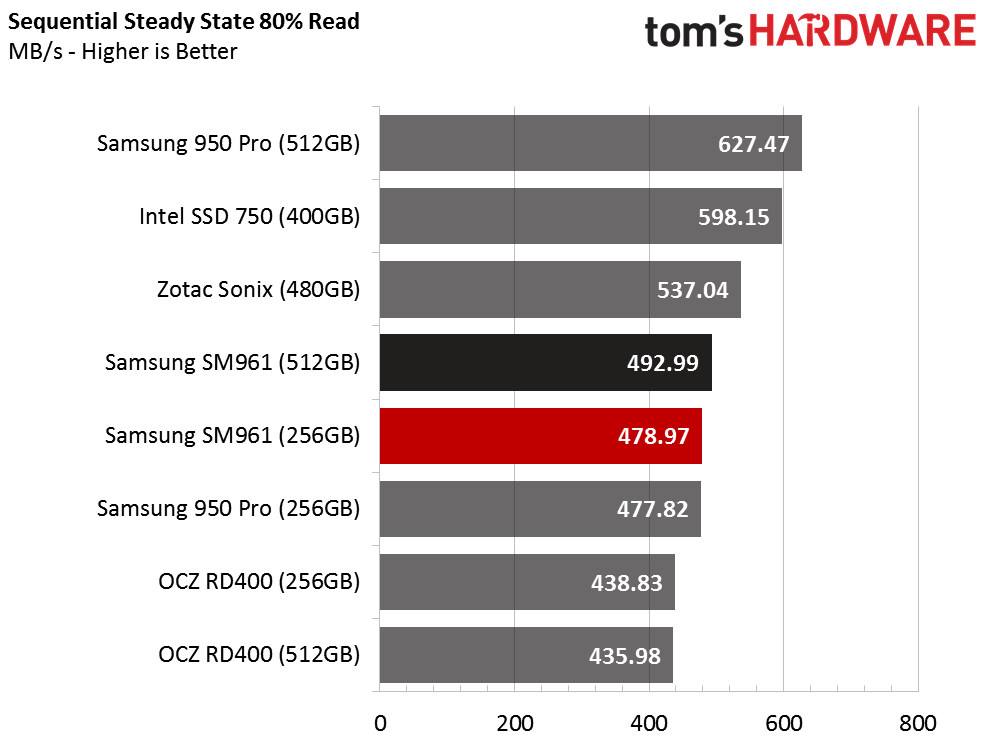
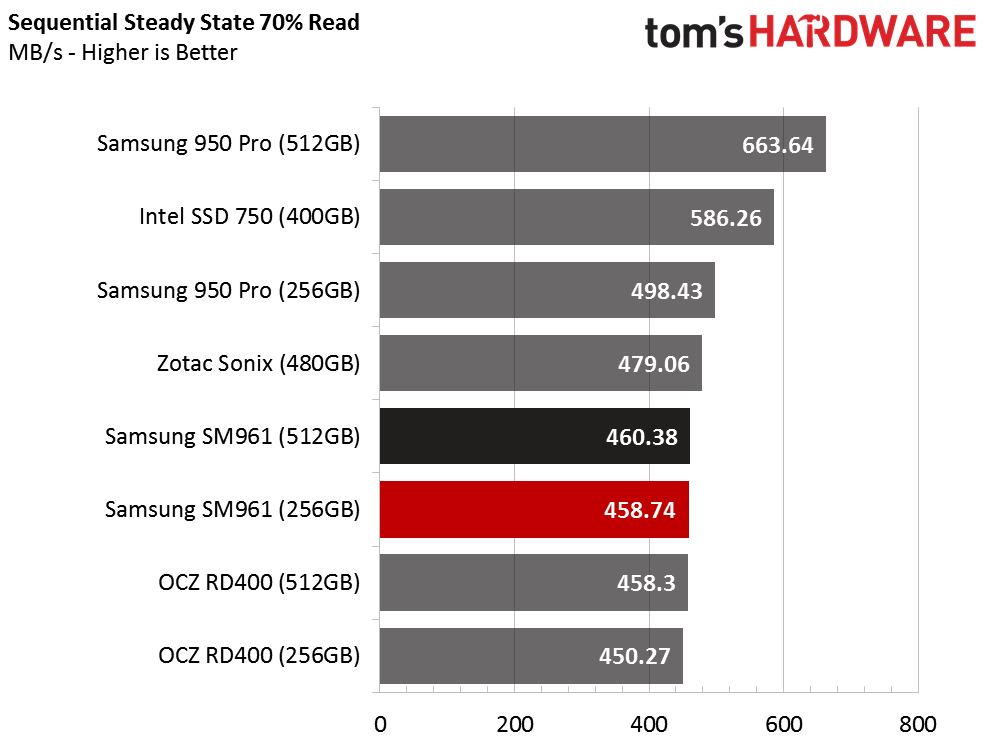
The sequential steady state test shows us that the Samsung 48-layer 3D flash delivers nearly identical performance to the older 32-layer flash SSDs. In this test, we place a heavy load on the flash to examine the drive's ability to process new data on dirty cells. Pushing the SSD into a steady state triggers its garbage collection algorithms, which can highlight performance during sustained heavy usage.
The SM961 and 950 Pro both lack any significant spare area dedicated to overprovisioning. The 950 Pro 512GB delivers the highest performance in this test, but only by a small margin. The 950 Pro 512GB features twice the number of NAND die compared to the SM961 512GB, which gives it the benefit of more parallelism, which boosts its performance.
Random Write Steady State
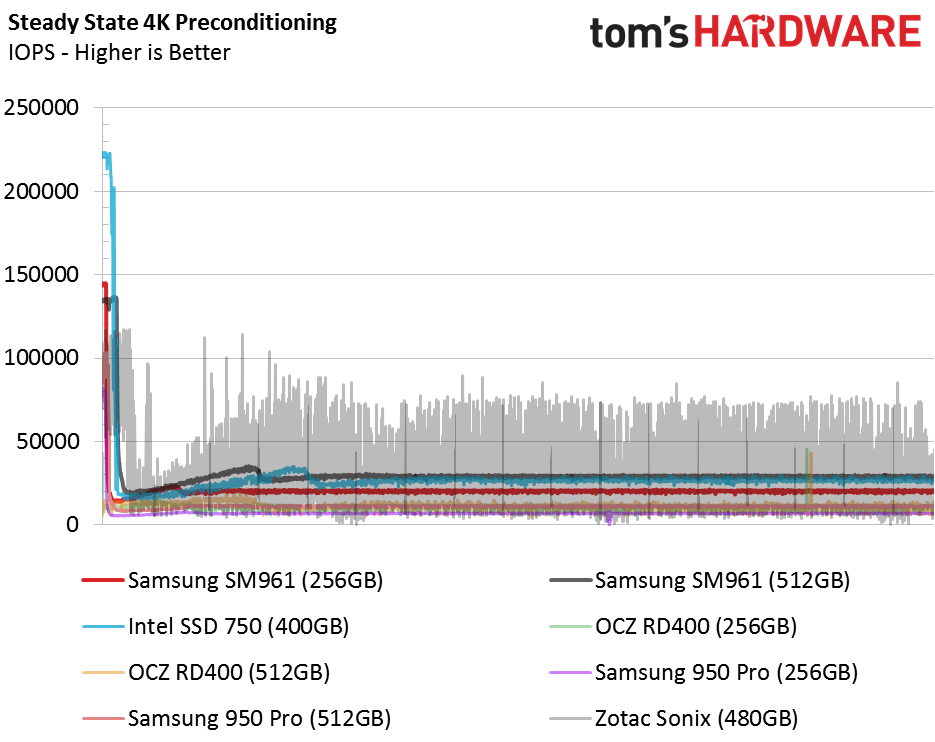
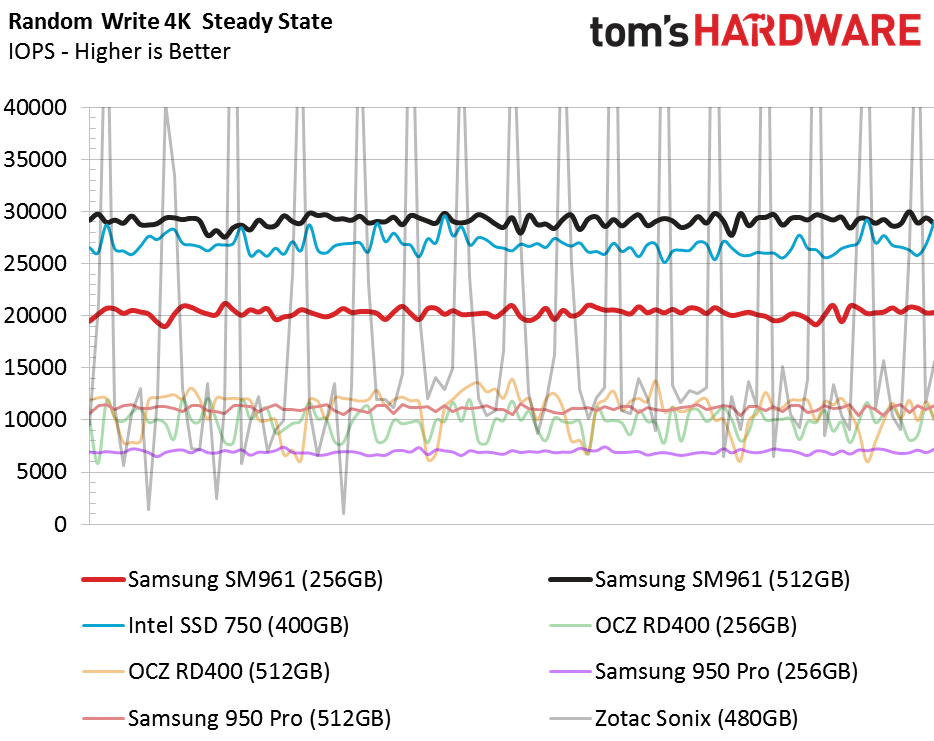
The SM961 512GB SSD delivers the highest consistent random 4KB data write performance in steady state. The Zotac Sonix 480GB peaks at a higher rate, but it can't sustain the performance for very long; it also drops the most after sustained use. The Intel SSD 750 places between the two SM961 drives during the test and the 256GB SM961 falls in line just behind it.
Get Tom's Hardware's best news and in-depth reviews, straight to your inbox.
Current page: Mixed Workloads & Steady State
Prev Page Four-Corner Performance Testing Next Page Software Performance & Conclusion
Chris Ramseyer was a senior contributing editor for Tom's Hardware. He tested and reviewed consumer storage.
-
oczdude8 Can you please make those line graphs more readable? Its really hard to distinguish between the 950 pro and the ocz drive. I suggest using dashes or dots as well as colours instead of using two very similar coloursReply -
velocityg4 I don't get why Samsung would make these an OEM exclusive. It seems to me that aftermarket enthusiasts would be the major purchasers.Reply
What OEM would even use these? Most OEM SSD options are low grade entry level SSD. Apple is the best I've seen, using the Samsung SM951 in a proprietary form factor. The highest I've seen any other OEM use is the Samsung PM951 (Dell XPS laptop, MS Surface, Lenovo Yoga 900).
Do these just show up in high end workstations or servers? So far the only manufacturer I'm aware of whom would likely include these would be Apple. If they ever get off their butts and update their premium priced yet obsolete hardware.
As manufacturers are hesitant to boast in their specs what SSD they use. How would you even know without purchasing the computer or finding a teardown that the SM961 is in there? -
CRamseyer HP, Dell, and Lenovo all sold products with the SM951. We purchased the Lenovo X1 Carbon Gen 3 just to the the first drive available for review. HP sent over a Z Turbo (SM951+workstation adapter) and the new quad version that puts 4 in a single PCIe device. Dell used the drive in one of the high end ultralight notebooks.Reply
